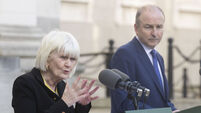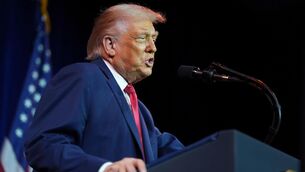A man's guide to not having menopause
So here's a thing. Apparently, I'm menopausal. Yes, me. Despite having never possessed the requisite plumbing for such an endeavour, I am now, according to medical fashion, experiencing my very own version of The Change. Complete with hot flushes, inexplicable rage at traffic lights, and - God help me - a genuine interest in cardigans. It's a bit like being told you've caught pregnancy from a toilet seat - biologically impossible, yet somehow here we are. It's called 'male menopause', which is rather like calling a paper cut "male caesarean section" just because both involve bleeding.
I discovered this earth-shattering news while researching why I recently dithered over a simple decision with Churchillian rumination. I passed a blissful hour in our local garden centre, deliberating over the purchase of two identical trays of winter cyclamens and a small heather, as if our winter survival depended on it. My wife, observing this spectacle with the weary resignation of someone who's witnessed similar episodes involving bathroom tiles and breakfast cereals, gently suggested I might be suffering from what she diplomatically termed "a spot of cognitive decline".
However, upon consulting the internet, with its infinite possibilities, I correctly self-diagnosed the andropause. Which sounds like something you'd catch from a poorly ventilated lift in Athens.
The medical establishment, bless their opportunistic hearts, has provided us with a smorgasbord of terminology. "Late-onset hypogonadism" sounds like a condition you'd develop from sitting too long on a defective radiator. "Testosterone deficiency syndrome" makes it sound like I'm running low on premium unleaded. My personal favourite is "age-related androgen decline", which is basically a costly way of saying "getting older, you old fool".
Now, I've always prided myself on being reasonably intelligent. I can operate a smartphone without calling technical support, I know the difference between Pinot Grigio and vinegar, and I once successfully assembled an IKEA bookshelf without requiring counselling. But apparently, none of this matters because my testosterone levels are dropping at the catastrophic rate of one per cent per year. One per cent! That's less decline than my patience during Christmas shopping, yet somehow it's worthy of medical intervention.
According to WebMD and similar sources, the symptoms include fatigue, irritability, decreased libido, and reduced muscle mass. I'm tired, grumpy (have you seen the news?), uninterested in certain activities, and probably physically unimpressive. Basically, I'm a normal human being over 50, but apparently this now constitutes a medical condition requiring urgent attention and possibly pharmaceutical intervention.
Now, female menopause - that's the real deal. Proper biological theatre where the ovaries basically stage a walkout, taking with them fertility, rational thought, and the ability to regulate a comfortable body temperature with them. It's hormonal bankruptcy, at once swift and unforgiving, decisive, and unavoidable. We men, meanwhile, experience something more akin to a gentle economic downturn. The sort where you don't quite notice your chaffed shoes until someone points out you've been wearing the same jumper for three weeks and getting genuinely excited about a new brand of birdseed.
Only 2.1% of men over the age of 65 actually have clinically low testosterone levels. The rest of us are simply experiencing what our grandfathers called "getting on a bit" and dealing with it by wearing more jumpers and complaining about young people. But we've decided to medicalise this perfectly normal process because, apparently, we can't bear the idea of simply getting older without there being a pill for it.
The real culprits? Not our supposedly flagging hormones. It's our expanding waistlines, our binge-watching habits, and our toxic relationship with modern life. Obesity massacres testosterone levels quicker than you can order a second pint. Similarly, the fact that we consider walking to the fridge as cardio - these are what actually precipitate our decline. But dealing with any of that means work. Actual effort. Much easier to blame a mysterious hormonal decline and wait for science to fix us with a tablet.
Enter testosterone replacement therapy, the automotive equivalent of trying to fix a knackered Ford Mondeo by installing a Formula One engine. It promises to restore the vigour of youth to men who haven't seen their feet without a mirror since Bertie Ahern was Taoiseach. The side effects? Oh, nothing much. Just potential heart problems, blood clots, and the possibility of turbocharging any cancer cells that might be lurking about like unwelcome party guests.
The Americans have, predictably, turned this into a billion-dollar industry. They've convinced millions of men that feeling a bit knackered at 50 is a medical emergency requiring immediate chemical intervention. It's genius marketing: take the universal experience of ageing, slap a medical label on it, then sell the cure to anyone who's ever fallen asleep during a debate.
Meanwhile, the NHS, with typical British restraint, has declared male menopause "not a clinical condition" and dismissed it as "an unhelpful term sometimes used in the media". This is NHS-speak for "complete balderdash", delivered with the sort of diplomatic understatement usually reserved for international incidents.
But here's where it gets interesting. The symptoms we're supposedly suffering from are absolutely real. Men do get tired, moody, and generally fed up with life's increasing complexity. We do look in mirrors and wonder when we started resembling our fathers, complete with mysterious ear hair and an encyclopaedic knowledge of weather patterns. We do find ourselves getting irrationally excited about things like shelving storage solutions and really good vacuum cleaners.
The cure, according to every medical expert who isn't trying to sell you something, is almost offensively simple. Lose weight. Exercise. Sleep properly. Eat vegetables. Don't drink like you're still 25. Basically, behave like a functioning adult human being instead of an overgrown teenager with a mortgage.
There's something wonderfully deflating about this revelation. In an age of complicated medical interventions and designer pharmaceuticals, the solution to male middle-age angst turns out to be the same advice your PE teacher gave you 30 years ago: put down the pie and go for a run.
I've decided to embrace my so-called andropause with the dignity it deserves. I will continue to grunt when getting up from low chairs – it's practically the law after 45. I will maintain my newfound appreciation for comfortable footwear and my inexplicable ability to spend entire afternoons in the local garden centre without purchasing anything. I will accept that my idea of a wild night now involves staying up past 9.30pm to watch the weather forecast while topping up a glass of wine.
Perhaps we men should resist the urge to pathologise the perfectly normal process of ageing. Because middle age isn't a disease requiring treatment - it's simply life's way of preparing you for the final act. And if that preparation involves developing strong opinions about lawn care and the optimal temperature for serving cheese, well, there are worse ways to spend your declining years.
After all, at least we don't have to actually go through menopause. Though given how we handle man flu, perhaps it's better that we don't.





